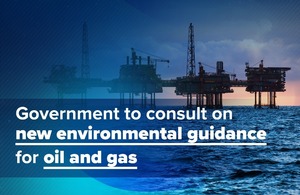Certainty for oil and gas industry in light of landmark ruling
Government announces plans for new environmental guidance for oil and gas firms as the North Sea transitions to its clean energy future.

The government has today announced plans for new environmental guidance for oil and gas firms to provide stability for industry, support investment, protect jobs, deliver economic growth, and meet its climate obligations, as the North Sea transitions to its clean energy future.
The guidance is necessary in light of a Supreme Court ruling that has implications for the assessment of new development consents. The landmark Finch ruling requires regulators to consider the impact of burning oil and gas, scope 3 emissions, in the Environmental Impact Assessment for new projects.
Having been elected on a mandate to deliver an orderly and prosperous transition in the North Sea that secures current and future generations of good jobs, and meets the UK’s legally-binding targets, the government is acting immediately. It will consult on new guidance in light of the Supreme Court ruling. Engagement with industry, workers, trade unions, and civil society will provide clarity and certainty for the industry and ensure a fair, orderly and prosperous transition in the North Sea in line with our climate and legal obligations.
The government is acting swiftly so that decisions on oil and gas development consents can be made. The government recognises the proud history of the UK offshore industry and the brilliance of its workforce, particularly in Scotland and the Northeast of England, and the ongoing role of oil and gas in the country’s energy mix.
Crucially, oil and gas production in the North Sea will be a key component of the UK energy landscape for decades to come as it transitions to our clean energy future in a way that protects jobs. The government believes that offshore workers will lead the world in the industries of the future.
With its number one mission of growth and wealth creation, ministers’ sleeves are rolled up ready to support investment and projects that can deliver jobs, growth, and energy security, and drives towards the UK’s clean energy future.
Since coming to office in July, there has been urgent action already taken toward the government’s clean energy mission. Great British Energy, which will be headquartered in Scotland, was launched by the Prime Minister and Energy Secretary last month, coming after the biggest ever investment in offshore wind, ending the onshore wind ban, and consenting homegrown solar; and steps taken to move ahead with new North Sea industries like carbon capture and storage and hydrogen.
Minister for Energy Michael Shanks said:
This government is committed to making Britain a clean energy superpower, helping to meet our first mission to kickstart economic growth. While we make that transition the oil and gas industry will play an important role in the economy for decades to come.
As we support the North Sea’s clean energy future, this government is committed to protecting current and future generations of good jobs as we do so.
We were elected with a mandate to deliver stability, certainty and growth. Every action we take will be in pursuit of that. We will consult at pace on new guidance that takes into account the Supreme Court’s ruling on Environmental Impact Assessments, to enable the industry to plan, secure jobs, and invest in our economy.
Background
- The government will not challenge the judicial reviews brought against development consent for the Jackdaw and Rosebank offshore oil and gas fields in the North Sea. This decision will save the taxpayer money.
- This litigation does not mean the licences for Jackdaw and Rosebank have been withdrawn.
- The government will also consult later this year on the implementation of its manifesto position not to issue new oil and gas licences to explore new fields.
- The government will aim to conclude its consultation by spring 2025. Further details including the timings for consultation will be published in due course. In the meantime, the government will be working in partnership with operators to navigate the implications for individual projects.